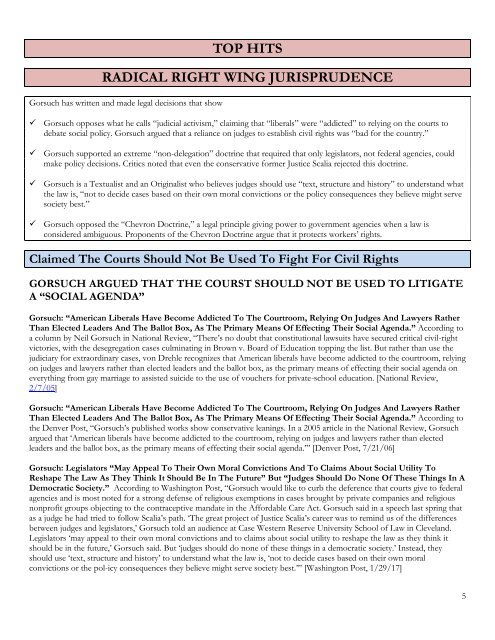Create successful ePaper yourself
Turn your PDF publications into a flip-book with our unique Google optimized e-Paper software.
TOP HITS<br />
RADICAL RIGHT WING JURISPRUDENCE<br />
<strong>Gorsuch</strong> has written and made legal decisions that show<br />
<strong>Gorsuch</strong> opposes what he calls “judicial activism,” claiming that “liberals” were “addicted” to relying on the courts to<br />
debate social policy. <strong>Gorsuch</strong> argued that a reliance on judges to establish civil rights was “bad for the country.”<br />
<strong>Gorsuch</strong> supported an extreme “non-delegation” doctrine that required that only legislators, not federal agencies, could<br />
make policy decisions. Critics noted that even the conservative former Justice Scalia rejected this doctrine.<br />
<strong>Gorsuch</strong> is a Textualist and an Originalist who believes judges should use “text, structure and history” to understand what<br />
the law is, “not to decide cases based on their own moral convictions or the policy consequences they believe might serve<br />
society best.”<br />
<strong>Gorsuch</strong> opposed the “Chevron Doctrine,” a legal principle giving power to government agencies when a law is<br />
considered ambiguous. Proponents of the Chevron Doctrine argue that it protects workers’ rights.<br />
Claimed The Courts Should Not Be Used To Fight For Civil Rights<br />
GORSUCH ARGUED THAT THE COURST SHOULD NOT BE USED TO LITIGATE<br />
A “SOCIAL AGENDA”<br />
<strong>Gorsuch</strong>: “American Liberals Have Become Addicted To The Courtroom, Relying On Judges And Lawyers Rather<br />
Than Elected Leaders And The Ballot Box, As The Primary Means Of Effecting Their Social Agenda.” According to<br />
a column by <strong>Neil</strong> <strong>Gorsuch</strong> in National Review, “There’s no doubt that constitutional lawsuits have secured critical civil-right<br />
victories, with the desegregation cases culminating in Brown v. Board of Education topping the list. But rather than use the<br />
judiciary for extraordinary cases, von Drehle recognizes that American liberals have become addicted to the courtroom, relying<br />
on judges and lawyers rather than elected leaders and the ballot box, as the primary means of effecting their social agenda on<br />
everything from gay marriage to assisted suicide to the use of vouchers for private-school education. [National Review,<br />
2/7/05]<br />
<strong>Gorsuch</strong>: “American Liberals Have Become Addicted To The Courtroom, Relying On Judges And Lawyers Rather<br />
Than Elected Leaders And The Ballot Box, As The Primary Means Of Effecting Their Social Agenda.” According to<br />
the Denver Post, “<strong>Gorsuch</strong>’s published works show conservative leanings. In a 2005 article in the National Review, <strong>Gorsuch</strong><br />
argued that ‘American liberals have become addicted to the courtroom, relying on judges and lawyers rather than elected<br />
leaders and the ballot box, as the primary means of effecting their social agenda.’” [Denver Post, 7/21/06]<br />
<strong>Gorsuch</strong>: Legislators “May Appeal To Their Own Moral Convictions And To Claims About Social Utility To<br />
Reshape The Law As They Think It Should Be In The Future” But “Judges Should Do None Of These Things In A<br />
Democratic Society.” According to Washington Post, “<strong>Gorsuch</strong> would like to curb the deference that courts give to federal<br />
agencies and is most noted for a strong defense of religious exemptions in cases brought by private companies and religious<br />
nonprofit groups objecting to the contraceptive mandate in the Affordable Care Act. <strong>Gorsuch</strong> said in a speech last spring that<br />
as a judge he had tried to follow Scalia’s path. ‘The great project of Justice Scalia’s career was to remind us of the differences<br />
between judges and legislators,’ <strong>Gorsuch</strong> told an audience at Case Western Reserve University School of Law in Cleveland.<br />
Legislators ‘may appeal to their own moral convictions and to claims about social utility to reshape the law as they think it<br />
should be in the future,’ <strong>Gorsuch</strong> said. But ‘judges should do none of these things in a democratic society.’ Instead, they<br />
should use ‘text, structure and history’ to understand what the law is, ‘not to decide cases based on their own moral<br />
convictions or the pol-icy consequences they believe might serve society best.’” [Washington Post, 1/29/17]<br />
5


